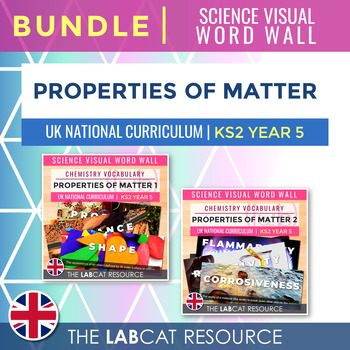PROPERTIES OF MATTER | Science Visual Word Wall Bundle [UK]
- Google Drive™ folder
- Easel Activity

Products in this Bundle (2)
Also included in
- Create a visually-stimulating and concept-forming learning environment with these stunning visual word walls!Enhance the learners' conceptualisation and schema-forming capabilities with text-editable visual word walls. It comes with a wide variety of size, printing options, and format options. FeatuPrice $7.50Original Price $9.00Save $1.50
Description
Create a visually-stimulating and concept-forming learning environment with these stunning visual word walls!
Enhance the learners' conceptualisation and schema-forming capabilities with text-editable visual word walls. It comes with a wide variety of size, printing options, and format options. Featured with high quality background images, this product would surely make science vocabulary words easier to recall and conceptualise.
Features:
- Editable texts
- High-quality images
- Visually-stimulating
- Highly flexible
- Level-appropriate definitions
- Highlighted keywords
- Includes printing instructions
- In British English
Alignment:
If you are in the Philippines, then this includes grades 4 to 5 level vocabulary, and is fully aligned with the PH K12 Curriculum:
- S3MT-Ia-b-1: Describe different objects based on their characteristics (e.g. shape, weight, volume, flow);
- S4MT-Ia-1: Classify materials based on their ability to absorb, float, sink, undergo decay;
- S5-MT-Ia-b-1: Use the properties of materials whether they are useful or harmful;
- S5-MT-Ih-i-4: Design a product out of local, recyclable, solid and/or liquid materials in making useful products.
If you are in the USA, then this includes grade 5 level vocabulary, and is fully aligned with the NGSS:
- 2-PS1-1: Plan and conduct an investigation to describe and classify different kinds of materials by their observable properties;
- 2-PS1-2: Analyse data obtained from testing different materials to determine which materials have the properties that are best suited for an intended purpose;
- 5-PS1-3: Make observations and measurements to identify materials based on their properties.
If you are in England, UK, then this includes year 5 level vocabulary, and is fully aligned with the National Curriculum for Science:
- Year 5, Properties and Changes of Matter - 1: Compare and group together everyday materials on the basis of their properties, including their hardness, solubility, transparency, conductivity (electrical and thermal), and response to magnets;
- Year 5, Properties and Changes of Matter - 4: Give reasons, based on evidence from comparative and fair tests, for the particular uses of everyday materials, including metals, wood, and plastic.
Included Vocabulary:
The 30 vocabulary words are divided into 6 classifications for easier differentiation.
- Basic 1 (property, distance, shape, colour, texture)
- Basic 2 (hardness, odour, flexibility, elasticity, transparency)
- Intermediate 1 (physical property, chemical property, absorbency, density, buoyancy)
- Intermediate 2 (flammability or combustibility, reactivity, corrosiveness, toxicity, biodegradability)
- Advanced 1 (quantitative property, qualitative property, weight, conductivity, magnetism)
- Advanced 2 (extensive property, intensive property, malleability, ductility, solubility)
Size Variations:
- A4 (full landscape, half crosswise, half lengthwise)
- Index Card (3" x 5")
Text Options:
- Vocabulary word only
- With Definition
Formats Included:
- Printable
- Presentation
- Interactive Slides
- Easel
Available Product Variations:
- Classic Word Wall in American English
- Classic Word Wall in British English
- Visual Word Wall in American English
FOLLOW ME!
Click the green star under THE LABCAT RESOURCE's shop name to get updates on new products, sales, and more!
EARN TPT CREDITS!
TPT credits can be used to lower the cost of your future purchases. If you have already bought this product, go to My Purchases page and click on Provide Feedback found beside this product.





